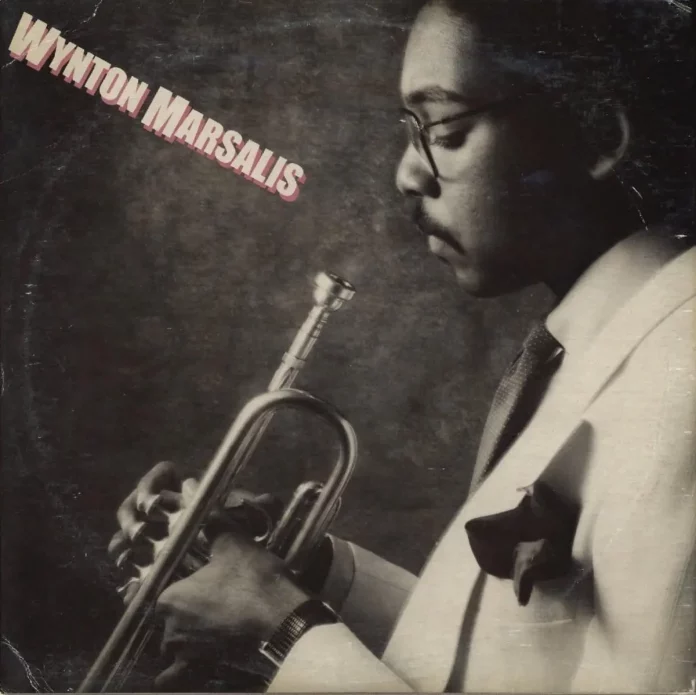That part of the jazz world which has been unable to take to post-Ornette Coleman music has been searching for a new trumpeter for some time. As a result, successive media hype has made me increasingly suspicious of any proclamations (remember the hoohah over Jon Faddis, whose new clothes – like those of a previous ’emperor’ – proved to be less than evanescent?). Prudence should therefore be an essential guideline in these matters, but, when a debut album is as impressively assembled as this, caution becomes a little stretched.
Technically, Marsalis is as well-equipped as two previous Messengers, Lee Morgan and Freddie Hubbard. Art Blakey, who nurtured both (as well as Kenny Dorham and Clifford Brown), says: “This guy makes the young kids all over the world want to cut their wrists.” But Marsalis’s technique is simply the means to an expressive end, indicating that, although only 20, he is already maturing rapidly and outgrowing the desire to grandstand for its own sake.
It allows him to vary his tone quite satisfyingly according to the spontaneous needs of self-expression, so comparisons with other trumpeters (Hubbard is the most frequent thus far) are rather superficial. In fact, Marsalis’s work suggests closer listening to Kenny Dorham and Booker Little than others among his forebears. He is expanding on the former’s methods of thematic development, but in a personal way, and there are times when his ringing melody is redolent of Little’s tart lyricism.
More intriguing is Marsalis’ rhythmic sense, which underpins his entire approach to improvisation – melody, harmony and mood – thus lending his work impressive unity . . . and variety.
His ability to pace a solo, using fragments of theme and rhythm to illuminate his lines is evident from the opener, Father Time, a surprisingly complex piece combining 4/4, 3/4 and Latin sections, which are repeated during the solos. Wynton’s solo is full of melodic twists, bent notes, unexpected rests and rhythmic contrasts, revealing something fresh with successive playings. His 21-year-old brother is equally impressive, evincing a similarly searching rhythmic sense, personal dark tone and telling use of space. The brothers feed well off each other, bouncing ideas for the other to develop.
This is even more sharply focused on Hesitation, an abbreviated bop piece which is really a rhythmic sequence. The absence of piano adds to its visceral qualities through what is in essence a ‘chase’, trumpet and tenor exchanging asymmetric passages which first decrease in length then extend. Not only is this exciting, but it is also risky. It takes a mature sense of form to play this game and reach base properly.
The serpentine R J produces a spiky, harmon-muted solo of skittering runs which swerve into glissandi and unexpected slow phrases. Branford’s soprano timbre is less personal than his tenor but his rhythmic sense remains sure here. Sister Cheryl places a slow, curving melody over a contemporary Latin vamp and Wynton’s unhurried solo winds vine-like around it. Here, on Who Can I Turn To? and on I’ll Be There, he plays with a singing elegance that echoes Booker Little while expressing melody in a personal way.
All three rhythm sections back the horns superbly, bassists Carter (Hesitation) and Messenger colleague Fambrough (Twilight) being particularly outstanding. Piano honours are just taken by Kirkland (courtesy of his seething solo on the spooky Twilight), despite the unexpected pleasure of an acoustic Hancock’s contributions, though it may be significant that the pianoless Hesitation generates possibly the most memorable performances from the Marsalis brothers.
Wynton (named for his father’s friend, pianist Wynton Kelly) has produced an absorbing document, though his brother’s part in its success must not be overlooked. It may not be entirely without echo of former mentors, but the way both men order their material and make mature use of all their musical resources puts this among the most promising debut recordings for a long time.
Discography
(d) Father Time; I’ll Be There When The Time Is Right+ ; (a) R.J.+ ; (b) Hesitation (20.05) – (a) Sister Cheryl+ ; (c) Who Can I Turn To?; (e) Twilight (20.34)
(a) Marsalis (t); Branford Marsalis (ss / ts); Herbie Hancock (p); Ron Carter (b); Tony Williams (d). Tokyo, prob 7/81. (b) Omit Hancock; same date. (c) as (a), omit Branford Marsalis; same date. (d) Wynton Marsalis (t); Branford Marsalis (ss+ /ts); Kenny Kirkland (p); Clarence Seay (b); Jeff Watts (d). NYC, summer 1981. (e) Charles Fambrough (b) replaces Seay. NYC, summer 1981.
(CBS 85404)
















